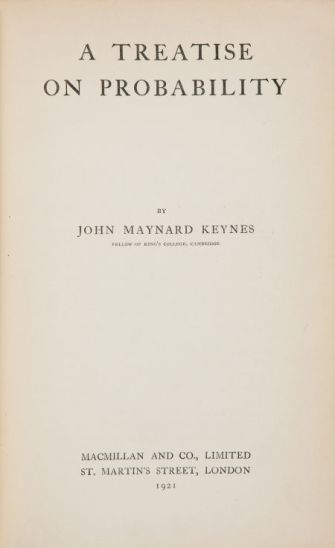Bayes vs. Keynes on probability and belief in economic theory An alternative possibility is to accept the consequences of the apparent fact that the central prediction of the Bayesian model in its descriptive capacity, that people’s choices are or are ‘as if’ they are informed by real-valued subjective probabilities, is, in general, false … According to Keynes’s decision theory it is rational to prefer to be guided by probabilities determined on the basis of greater evidential ‘weight’, the amount or completeness, in some sense, of the relevant evidence on which a judgement of probability is based … Keynes later suggests a link between weight and confidence, distinguishing between the ‘best estimates we can make of probabilities and the confidence with which we make them’ … The distinction between judgement of probability and the confidence with which it is made has no place in the world of a committed Bayesian because it drives a wedge into the link between choices and degrees of belief on which it is founded. Jochen Runde Almost a hundred years after John Maynard Keynes wrote his seminal A Treatise on Probability (1921), it is still very difficult to find economics textbooks that seriously try to incorporate his far-reaching and incisive analysis of induction and evidential weight.
Topics:
Lars Pålsson Syll considers the following as important: Economics
This could be interesting, too:
Lars Pålsson Syll writes Schuldenbremse bye bye
Lars Pålsson Syll writes What’s wrong with economics — a primer
Lars Pålsson Syll writes Krigskeynesianismens återkomst
Lars Pålsson Syll writes Finding Eigenvalues and Eigenvectors (student stuff)
Bayes vs. Keynes on probability and belief in economic theory
An alternative possibility is to accept the consequences of the apparent fact that the central prediction of the Bayesian model in its descriptive capacity, that people’s choices are or are ‘as if’ they are informed by real-valued subjective probabilities, is, in general, false …
According to Keynes’s decision theory it is rational to prefer to be guided by probabilities determined on the basis of greater evidential ‘weight’, the amount or completeness, in some sense, of the relevant evidence on which a judgement of probability is based … Keynes later suggests a link between weight and confidence, distinguishing between the ‘best estimates we can make of probabilities and the confidence with which we make them’ … The distinction between judgement of probability and the confidence with which it is made has no place in the world of a committed Bayesian because it drives a wedge into the link between choices and degrees of belief on which it is founded.
Jochen Runde
 Almost a hundred years after John Maynard Keynes wrote his seminal A Treatise on Probability (1921), it is still very difficult to find economics textbooks that seriously try to incorporate his far-reaching and incisive analysis of induction and evidential weight.
Almost a hundred years after John Maynard Keynes wrote his seminal A Treatise on Probability (1921), it is still very difficult to find economics textbooks that seriously try to incorporate his far-reaching and incisive analysis of induction and evidential weight.
The standard view in mainstream economics – and the axiomatic probability theory underlying it – is to a large extent based on the rather simplistic idea that ‘more is better.’ But as Keynes argues – ‘more of the same’ is not what is important when making inductive inferences. It’s rather a question of ‘more but different.’
Variation, not replication, is at the core of induction. Finding that p(x|y) = p(x|y & w) doesn’t make w ‘irrelevant.’ Knowing that the probability is unchanged when w is present gives p(x|y & w) another evidential weight (‘weight of argument’). Running 10 replicative experiments do not make you as ‘sure’ of your inductions as when running 10 000 varied experiments – even if the probability values happen to be the same.
According to Keynes we live in a world permeated by unmeasurable uncertainty – not quantifiable stochastic risk – which often forces us to make decisions based on anything but ‘rational expectations.’ Keynes rather thinks that we base our expectations on the confidence or ‘weight’ we put on different events and alternatives. To Keynes expectations are a question of weighing probabilities by ‘degrees of belief,’ beliefs that often have preciously little to do with the kind of stochastic probabilistic calculations made by the rational agents as modeled by mainstream social economics.
How strange that writers of economics textbooks as a rule do not even touch upon these aspects of scientific methodology that seems to be so fundamental and important for anyone trying to understand how we learn and orient ourselves in an uncertain world. An educated guess on why this is a fact would be that Keynes concepts are not possible to squeeze into a single calculable numerical ‘probability.’ In the quest for quantities one puts a blind eye to qualities and looks the other way – but Keynes ideas keep creeping out from under the mainstream economics carpet.
It’s high time that economics textbooks give Keynes his due.
